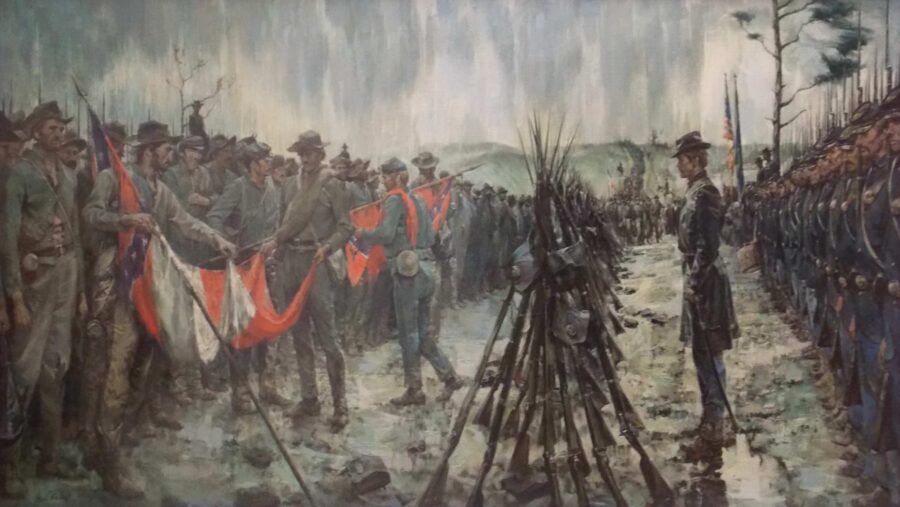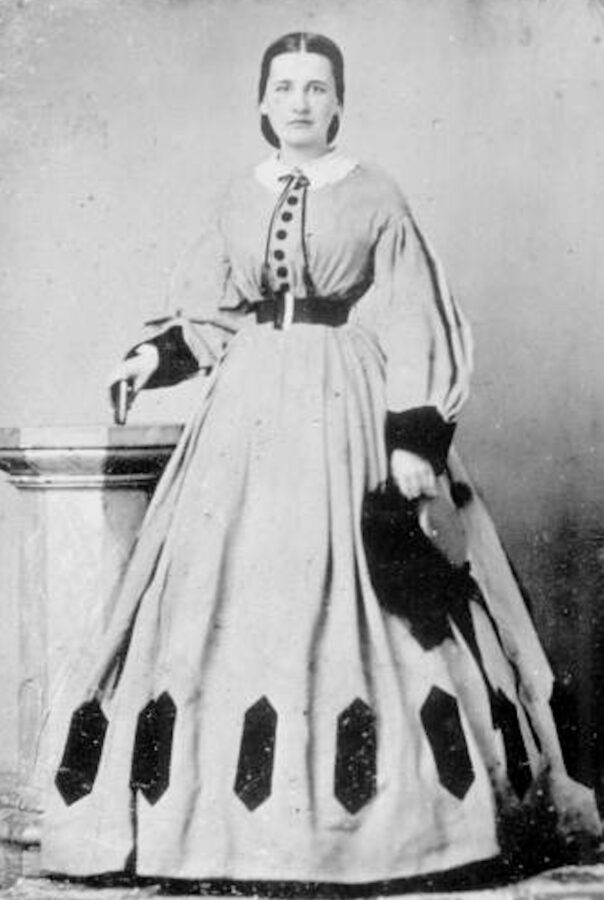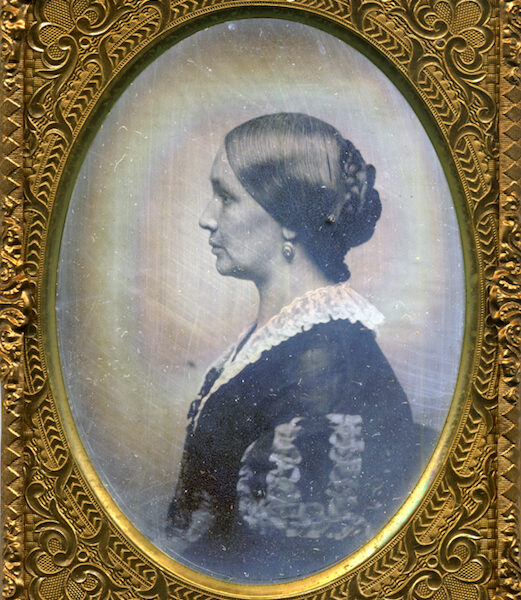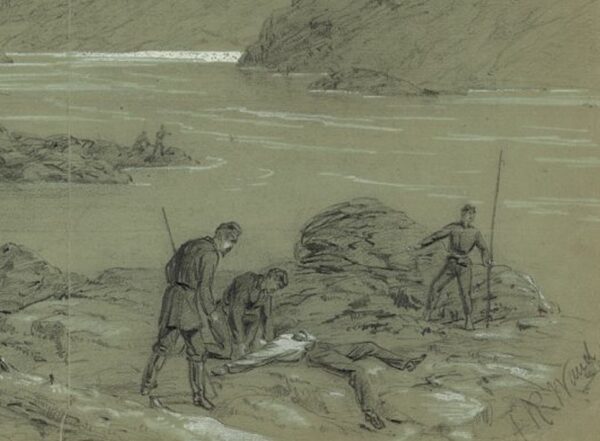 West Point Museum
West Point MuseumSoldiers from the Army of Northern Virginia furl their battle flags for the last time in Kenneth Riley’s 1961 painting “Surrender at Appomattox.”
Ten days after Robert E. Lee surrendered the Army of Northern Virginia to Ulysses S. Grant on April 9, 1865, 19-year-old Susan Bradford recorded the reaction she and her family had upon the return of relatives who had served in the Confederate army—including her brother-in-law, Junius Taylor, a captain in the 5th Florida Infantry—to the family’s Florida plantation home. What follows is her detailed account of the event from her journal.
April 19, 1865.—This morning at breakfast Father said, “Ten days since Lee’s surrender and none of our boys home yet.”
We look for them continually but they do not come. A miserable uncertainty hangs over us and we do not know what to expect. Ever since I can remember Father has been trying to teach me “self-control,” as he expresses it. He is teaching me to “fight my nerves.” Mother has no nerves—so everybody says, and in these trying days she is the mainstay of the household; we all look to her for help and Father says I must be just like Mother. I wish I was, she is such a comfort to us all and I will yet conquer nervousness, which Aunt Robinson says I inherit from the Bradford side of the house….
It is bedtime and I am writing in my own room; usually I write in the library, where Father sits, but tonight I want to be alone. Oft I have repeated, perhaps repeated boastfully, those brave lines:
“I am the master of my fate;
The captain of my soul.”
And now, I find I am but a broken reed, shaken by the wind. Let me write the day’s happenings while I can.
This morning we sat on the front porch watching the road. Father sat in his big rocker and Mother sat close beside him; Brother Amos and Sister Mag were sitting back in the vines, playing with little Rebecca, who was in her mother’s lap. Mattie was stretched out, full length on one of the porch seats, her beautiful golden curls falling to the floor. I sat on the steps and Eddie was spinning acorns beside me. Sister Mart is at Goodwood. For several days now the front porch has been the favorite place for the family to sit. Mattie is wild to see her father and she rehearses their meeting, making it different every day.
 State Archives of Florida, Florida Memory
State Archives of Florida, Florida MemorySusan Bradford, as she appeared in 1864
I was watching Eddie and did not know there was anything to see, when Father said, “There they come.” Entering the front gate, too far for my near-sighted eyes to distinguish one from another, were three Confederate soldiers. Poor fellows; they were pitiful. Thin and so browned by exposure, until they were hardly recognizable. Footsore and weary, on they came, Captain Bernard, stepping quicker than his companions.
We rushed to greet them but Brother Junius, who was next called out, “Do not come near me—send Bill to my room” and then he went rapidly away in the direction of the room which was always known as his….
Cousin Johnnie came last; his face the saddest you ever saw. Falling on the steps, he put his face in his hands and cried like a child. Cousin Johnnie, who of all men we knew was the most reticent and reserved.
Dear Mother always knows just what is best to do and say and with her sweet words of welcome, her inquiries after the health of each one, the hot coffee and cakes which she has had ready day after day; all this helped to restore the composure of all.
Jordan took Captain Bernard home and Father had his buggy brought to the door and carried cousin Johnnie home himself. Father loves uncle Richard so dearly and I believe his sons are almost as dear to Father as if they were his own.
In the meantime none of us had seen Brother Junius. Bill had made sundry trips back and forth from the room in the yard and the kitchen; several kettles of hot water had been transported and then Bill got a pitch-fork and came out, bearing the clothes Brother Junius had worn, and proceeded to burn them.
An inkling of the truth must have come to Mother for she said, “Come in the house children, Mr. Taylor will be in after awhile.”
Then Bill sent Aunt Morea to borrow the sharpest scissors. We did not see him until long after Father had returned and when he did get in the house he looked very different from the weary man whom we had caught a fleeting glimpse of. With his golden hair cut as short as Bill could do the work, his face clean shaven, dressed in a suit of civilian clothes, with immaculate linen and a white silk necktie, he was ready to be hugged and kissed and made much of by everyone, from Mother down to little Rebecca; though Mattie of course, came first. She was simply wild with joy.
Mother said he should not tell one word of happenings in Virginia until he had eaten a good, hot supper. She was right, as she always is. After supper we gathered ‘round him in the library and he began by telling us of the trying times the army had been exposed to for weeks before the surrender; but not a soldier made complaint and not one listened with any show of patience, to the thought of laying down their arms.
On through the days, his story went until that fateful 9th saw the ragged remnant of the Army of Northern Virginia drawn up in line on either side of the road, to see their beloved Commander pass. He was mounted on “Traveler” and a splendid new uniform added to his fine appearance. His men cheered him all along the line and he acknowledged their greetings. Never had soldiers so loved a chieftain as these men in gray loved Lee.
The army waited; sometime passed and then they saw through unbelieving eyes, their general, riding slowly toward them. His head, usually held so proudly, was low on his breast and not once did he raise his eyes. He made no pause; no need for words to tell them what had happened. When the realization came to them those war-worn veterans wept like David, when the news of Absalom’s death was brought to him.
Gladly would they have followed him into the “jaws of death” but this—it was more than they could bear. After an hour or so officers from General Grant came, with an order to stack arms and prepare to deliver to the United States authorities all army equipment. The entire Army of Northern Virginia were prisoners of war.
Again officers came from General Grant; these men must make oath that they would not bear arms against the government of the United States until such time as they should be exchanged. Still they were not disbanded. Another officer issued paroles and told them that a government transport would sail on the 11th from Norfolk to Savannah. They could go to Norfolk the next day and sail, that is as many as the transport would accommodate. A detachment of Grant’s men went with them. The transport was old and did not look sea-worthy but they were hustled on board, until there was hardly standing room. They had no provisions, no money. To add to the misery of the situation the transport was fairly alive with I. F. W.’s and they, too, were hungry.
“This,” he said, “will explain why I needed Bill and so much soap and water. Bill burned everything I wore, even my shoes and hat. Fortunately my trunk was well filled with clothing. Never in all my life have I felt so desperate, and, when those disgusting creatures took possession of me, I completely lost my self respect.”
With this he laid his head on the library table and sobbed. Such sobs as I had never heard—dry, harsh, choking. The room shook with their violence. Oh! it was awful to see that great, strong, splendid man, so completely unstrung. Before his story was ended Mattie had left the room and when we found her she was doubled up on Mother’s bed, and she had cried herself to sleep.
I sit here and wonder, wonder if all the dear “men in gray” feel as crushed and disconsolate as these? Is the home-coming painful to them all? Will they ever be able to forget? Will the time ever come when they can remember the glory, the honor, the magnificent courage they have shown, and take comfort in that? God help them and help us all.
Tomorrow we will take up our every-day life again, and in the little ordinary things of daily life the tension may be loosed. I will do as Father says and try to be like Mother.




Great story. Anyone know what an I.F.W. might be? (“the transport was fairly alive with I. F. W.’s”)